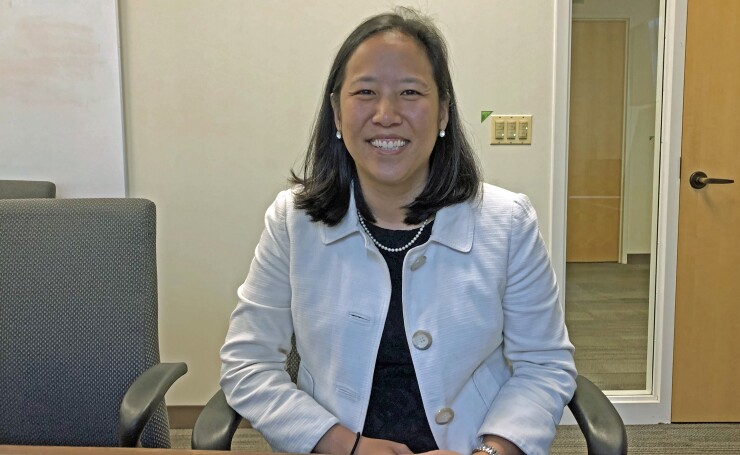Chicago Mayor Lori Lightfoot's requests for $1.85 billion of borrowing authority to support 2023-2024 capital spending and approval of a $336 million federal water infrastructure loan to replace lead-lined service lines join the proposed 2023 budget that's headed for a City Council vote in the coming days.
The council's Finance Committee Tuesday advanced the debt measures that also include an extension of $250 million of existing commercial paper authority and new authorization for a line of credit at Midway International Airport and a $50 million line of credit for unforeseen capital expenses at O'Hare International Airport's rental car facility.
The additional GO authority follows the

The city is tapping a portion of the prior bonding authority for a $757 million sale expected to price late this month or early in December.
With the combined programs, "the city is embarking on one of the largest capital plans and progressive neighborhood investment plans in the city's history," Jennie Huang Bennett, Chicago's chief financial officer, told the Finance Committee Tuesday. "Further, because the city now pays down hundreds of millions of dollars of debt a year we are able to do this while keeping our overall debt burden stable."
Bennett used the committee appearance to highlight the recent Fitch Ratings upgrade of the
"This upgrade is an enormous accomplishment for the city and is based off the hard work of Mayor Lightfoot and the city council to right the city's finances," Bennett said.
The upgrade combined with two upgrades over the summer
The city's improved pension funding status and structural budgetary balance drove the upgrade that comes as the City Council is weighing Lightfoot's proposed
Chicago hopes for further positive rating news that could come with passage of the budget. S&P Global Ratings, which rates Chicago's GOs BBB-plus with a stable outlook, offered positive words in a special commentary bulletin. Kroll Bond Rating Agency rates Chicago A and stable. Moody's Investors Service rates the city at the junk level of Ba1 with a stable outlook.
The city previously named teams for a series of GO deals expected over several years so it did not select new financing teams for the $1.85 billion of GO authority being considered. "We are basically putting the par into those original deal teams and basically increasing the size," Bennett said.
The teams for the new money tranches previously approved include RBC Capital Markets, Cabrera Capital Markets, and UBS as senior managers on the upcoming sale; Barclays and Loop Capital Markets on the second sale; and BofA Securities and Cabrera on the third.
The Finance Committee also signed off a key piece of legislation tied to the city's proposed 2023 budget: a $1.73 billion property tax levy. The levy is up $25 million from 2022 but that amount represents only new properties coming on the rolls. Lightfoot opted not to seek the up to 5% permitted under a change approved last year that allows for annual increases tied to inflation.
Separately, the Committee on Budget and Government Operations was taking up amendments to the 2023 budget during a meeting Wednesday with changes aimed at building council support ahead of a final budget vote Monday.
The new borrowing would support Lightfoot's five-year Chicago Works program unveiled last year. Lightfoot recently updated the program to reflect the next phase with projects approved for 2023 and 2024.
The 2023-2024 plan spends on public safety, with the planned purchase of more than 530 police vehicles and 80 fire department vehicles and equipment, facility renovations at over 50 public safety facilities, construction of a police driver training facility, $10 million in police district upgrades, $14 million for strategically deployed public safety cameras, and the purchase of bunker gear for new fire department recruits.
The program also directs spending to bridges, viaducts, streets, alleys, traffic signals and streetlights, sidewalks, waterways including $85 million for the reconstruction of a portion of the Lake Michigan shore and $198 million for various building upgrades.
The plan also directs $60 million for various expenses to replace water service lines made of lead.
The city's sweeping replacement needs that carry a projected $8.5 billion price tag will receive some help from the proposed $336 million Water Infrastructure Finance and Innovation Act loan the council is being asked to formally accept.
The federal government earlier approved the loan being taken out by the Chicago Department of Water Management for its Water Main and Lead Service Line Replacement Program that's in place to remove lead service lines from the distribution system to limit negative public health effects.
Chicago has an estimated 400,000 service lines made of lead, the most among U.S. cities. Lightfoot took initial steps in 2020
The Infrastructure Investment and Jobs Act





